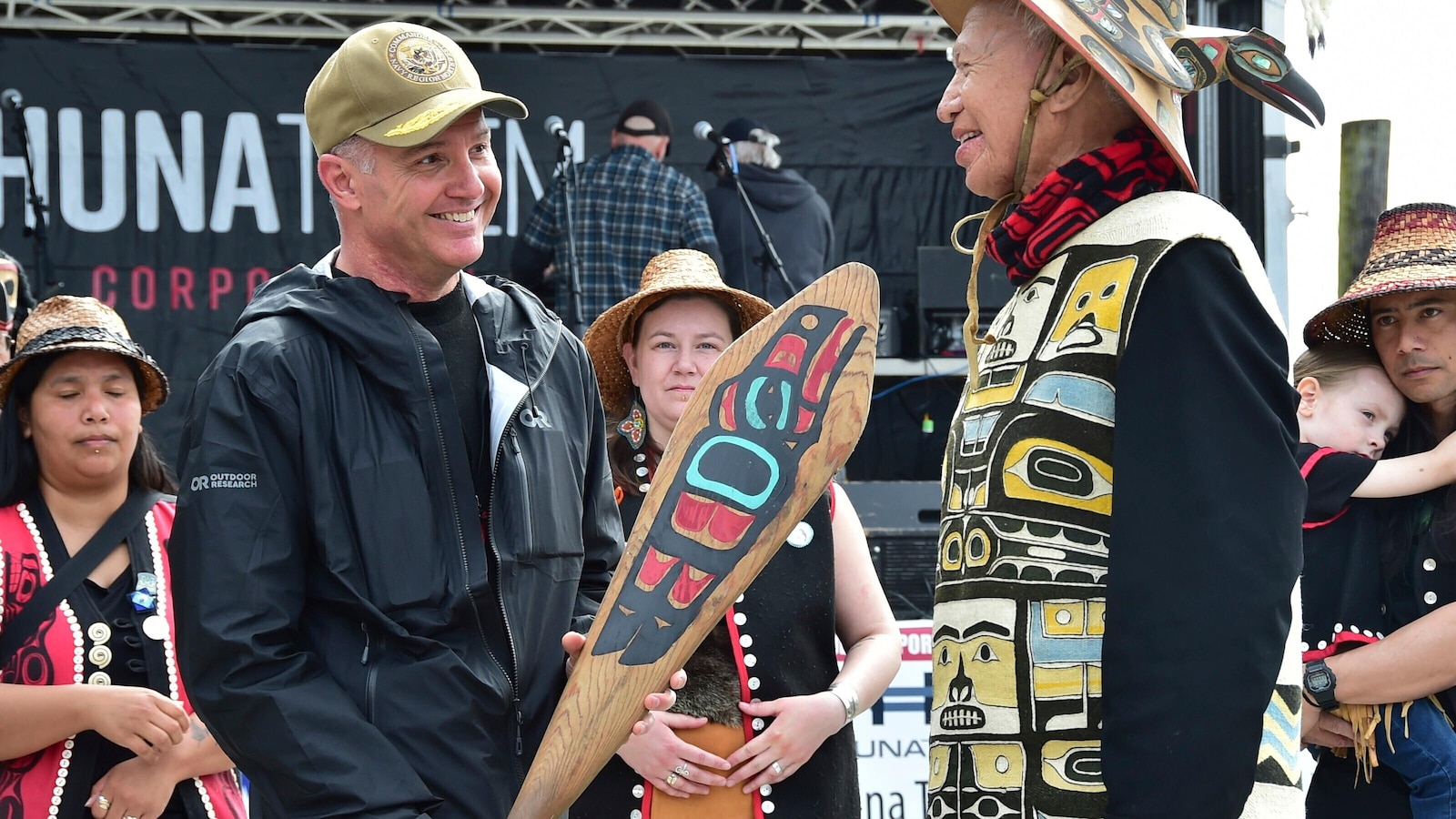
ANKERAGE, Alaska — As winter approached, shells fell on the Alaska Native village, after which sailors landed and burned the remains of houses, food supplies and canoes. Conditions became so dire in the following months that elderly people sacrificed their own lives to save food for the surviving children.
It was October 26, 1882 in Angoon, a Tlingit village of about 420 people in Alaska’s southeastern panhandle. Now, 142 years later, the perpetrator of the bombing – the US Navy – has apologized.
Vice Adm. Mark Sucato, the commander of the Navy’s Northwest Region, delivered the apology during a sometimes emotional ceremony Saturday, the anniversary of the atrocity.
“The Navy recognizes the pain and suffering inflicted on the Tlingit people, and we recognize that these wrongful acts have resulted in the loss of life, the loss of resources, the loss of culture, and the creation and infliction of intergenerational trauma on these clans,” he said. during the ceremony, which was streamed live from Angoon. “The Navy takes the significance of this action very seriously and knows an apology is long overdue.”
While the rebuilt Angoon received $90,000 in a settlement Along with the Ministry of the Interior in 1973, village leaders have also called for an apology for decades, beginning each annual commemoration by asking three times: “Is there anyone from the Navy here who wants to apologize?”
“You can imagine the generations of people who have died since 1882 and wondered what happened, why it happened, and wanted some sort of apology because in our minds we did nothing wrong,” Daniel Johnson Jr. said. ., a chieftain in Angoon.
The attack was part of a series of conflicts between the US military and Alaskans in the years after the US bought the territory from Russia in 1867. The U.S. Navy last month apologized for the 1869 destruction of the nearby village of Kake and the attack. The military has indicated it plans to apologize for the shelling of Wrangell, also in southeastern Alaska, that year. although no date has been set.
The Navy acknowledges that the actions it took or ordered in Angoon and Kake caused deaths, loss of resources and multi-generational trauma, Navy civilian spokesperson Julianne Leinenveber said in an email ahead of the event.
“An apology is not only warranted, but long overdue,” she said.
Today, Angoon remains a quaint village of about 420 residents, with colorful old houses and totem poles on the west side of Admiralty Island, accessible by ferry or seaplane, in the Tongass National Forest, the largest in the country. The population vastly outnumbers brown bears, and the village has sought to promote its ecotourism industry in recent years. Bald eagles and humpback whales are plentiful, and the salmon and halibut fishing is excellent.
Stories about the cause of the destruction vary, but usually begin with the accidental death of a Tlingit shaman, Tith Klane. Klane was killed when a speargun exploded on a whaling ship owned by his employer, the North West Trading Co.
The Navy’s version states that tribesmen forced the ship to shore, possibly taking hostages and, in accordance with their customs, demanding 200 blankets in compensation.
The company refused to provide the blankets and ordered the Tlingits to return to work. Instead, out of grief, they painted their faces with coal tar and tallow – something the company’s employees saw as a harbinger of an uprising. The company’s superintendent then sought help from Naval Cmdr. EC Merriman, the top U.S. official in Alaska, said a Tlingit uprising was threatening the lives and property of white residents.
The Tlingit version claims that the boat’s crew, which included Tlingit members, probably stayed with the ship out of respect, planned to attend the funeral, and that no hostages were taken. Johnson said the tribe never would have demanded compensation so soon after the death.
Merriman arrived on October 25 and insisted that the tribe deliver 400 blankets by noon the next day as punishment for disobedience. When the Tlingits were down to 81 members, Merriman attacked and destroyed twelve clan houses, smaller houses, canoes, and the village’s food stores.
Six children died in the attack, and “there are untold numbers of elderly people and infants who died that winter from both cold, exposure and starvation,” Johnson said.
Billy Jones, Tith Klane’s cousin, was 13 when Angoon was destroyed. He recorded two interviews around 1950, and his account was later included in a booklet prepared for the film 100th anniversary of the bombing in 1982.
“They left us homeless on the beach,” Jones said.
Rosita Worl, the president of the Sealaska Heritage Institute in Juneau, described how some elders “ran into the woods” that winter — meaning they died and sacrificed themselves so that the younger people would have more food.
Although the Navy’s written history conflicts with Tlingit oral tradition, the Navy remains true to the tribe’s story “out of respect for the long-lasting impact these tragic incidents had on the clans affected,” said Leinenveber, spokesperson for the navy.
Tlingit leaders were so stunned when Navy officials told them during a Zoom call in May that the apology was finally coming that no one said anything for five minutes, Johnson said.
Eunice James of Juneau, a descendant of Tith Klane, said she hopes the apology will help her family and the entire community heal. She expects his presence at the ceremony.
“Not only will his spirit be there, but the spirits of many of our ancestors, because we have lost so many,” she said.
